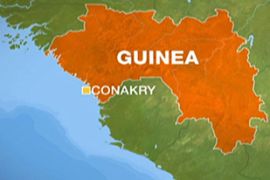Shooting as Guinea soldiers protest
Soldiers demonstrate against unpaid wages in the capital, Conakry.

The government also responded to protests by firing the defence minister who threatened to prosecute mutinous soldiers.
General seized
The Guinean army’s second-in-command was taken hostage by protesting troops on Monday, who started shooting into the air in their barracks.
Mamadou Sampil remains a hostage at the Alpha Yaya Diallo barracks, where soldiers said they would not consider his release until senior military officials came to the camp to negotiate directly.
“The generals need to come to the camp within 24 hours,” one soldier acting as their spokesman said.
Residents near Conakry’s airport said men in military trucks and uniforms briefly took control of the airport on Wednesday night before leaving on Thursday morning.
Mounting problems
Tensions started to rise in the West African country last week when Lansana Conte, Guinea’s president, unexpectedly fired Lansana Kouyate, the country’s prime minister.
Soldiers said they feared the new prime minister would not honour a pledge to pay them.
But on Tuesday, Ahmed Tidiane Souare, the newly appointed prime minister, promised that payments would begin within days.
Guinea, on Africa’s western coast, has vast reserves of timber, gold, diamonds and bauxite, the raw material used to make aluminum.
Yet it is consistently listed as one of the world’s poorest countries.
Conte has ruled the country since a 1984 coup, and agreed to appoint Kouyate – seen as a reformer – last year after union protests over his rule turned deadly and threatened to overturn the government.
Conte depends largely on the loyalty of the army to maintain his stay as president, and the government has previously given in to soldiers’ demands for pay increases when they have threatened violence – though actual pay-outs have often never materialised.